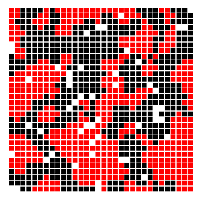Adding social ties to the Schelling model
- Started
- 20th June 2010
- Research Team
- Elisabeth zu-Erbach-Schoenberg
- Investigators
- Seth Bullock, Sally Brailsford
The traditional segregation model introduced by Schelling is one of the first models showing that macro-level behaviour might not follow intuitively from micro-level behaviour. Even though the behaviour of the individual components is governed by very simple rules, the resulting system behaviour is complex, meaning that it needs to be simulated to determine how a certain initial setup will develop over time.
In the original model, two distinct types of agents exist. These two types stand for a property that people can observe in others and therefore discriminate upon. Examples for this are skin-colour, gender or language. The agents have a threshold describing how many agents in their neighbourhood they want to be of their own type. Each agent evaluates its current location and if its threshold is not met, it decides to move to a place that fulfils its requirements. As it changes both the place it is moving from as well as the place it is moving to, the resulting dynamics are hard to predict.
We extended the original model by adding a social network that is influenced by the spatial arrangement and influences it in return. The social network is dynamic, meaning that connections are broken and new connections are made. New connections are biased towards local connection within a neighbourhood and this bias is tunable in strength. The social network an agent is embedded in changes its perception of the neighbourhood, meaning that it values friends (people it is connected to in the social network) differently from strangers.
We investigate the effects of the addition of a social network and the influence of the parameters on the system's dynamics.
Categories
Socio-technological System simulation: Social Networks
Algorithms and computational methods: Agents
Visualisation and data handling software: Gnuplot
Programming languages and libraries: Java
Computational platforms: Linux, Lyceum
Transdisciplinary tags: Complex Systems
